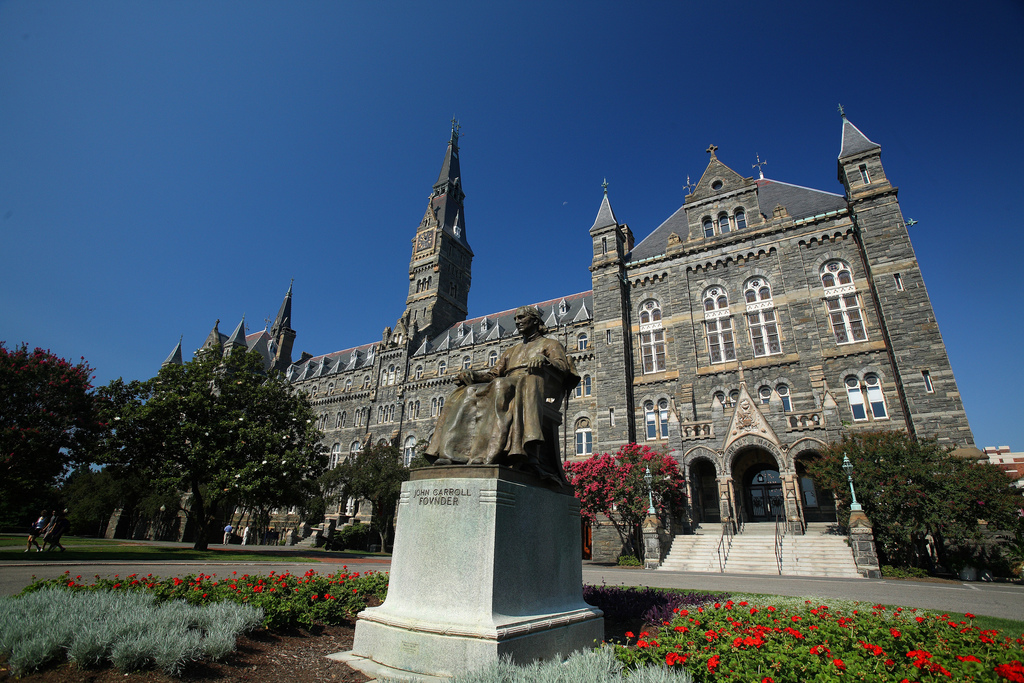On Thursday, the Georgetown student body had the opportunity to vote on a GUSA referendum regarding a complete ban on tobacco consumption on the university’s main campus. The referendum is a non-binding measure to gauge the student body’s opinion toward such a ban. The poll is simply a barometer, and the administration has been clear that, regardless of the results, a total ban on tobacco products will be implemented.
This editorial board believes that the referendum fails to offer a meaningful forum for student voices to be heard. On the ballot, students were presented with the statement “Georgetown’s main campus should be smoke and tobacco free” and chose from the responses “Agree,” “Disagree,” and “No Preference/Undecided.”
The referendum does not provide any information about the policies that will be implemented. Details regarding the ban are still undecided, leaving students to submit their opinions about a policy to which they will be subject, yet of which they lack a clear understanding.
We have identified several areas in which specifics have not yet been disclosed and in which a community opinion would be valuable.
The first regards the enforcement of the ban itself. When a total tobacco ban is implemented, the university will need to devise a corresponding enforcement mechanism. Per the Division of Student Affairs website, Georgetown’s policy is already “To achieve an environment as close to smoke-free as practically possible.” If community members choose to smoke, they must do so outside and away from buildings. An enforcement system does already exist if a student were ever to be reprimanded for violating the present smoking policy, although it is rarely enforced. These punishments begin with a $50 fine and an educational project for the first violation and increase in weight as the infractions repeat. Additionally, a permanent record of the infractions appears on the student’s transcript, visible to other universities, graduate and professional schools, scholarship and award providers, and employers. The university can also report the incident to the District, in which case an additional fine for smoking in a designated nonsmoking area would be levied by the city, although historically, Georgetown has demonstrated a preference to handle such matters internally.
Given the complex nature of addiction and a variety of previous efforts at substance prohibition, the current system may not be an appropriate way to deal with the issue of tobacco use on campus. Because of this, two questions follow, neither of which has an easy answer. On a reactive level, what is the correct way to enforce the ban? As a matter of public health, an anti-tobacco policy will have no benefit if there is not some method of enforcement, but that enforcement should not be overly harsh. On a proactive level, what sort of preventative measures should be made available to reduce the necessity of said enforcement measures? If the goal of the ban is to reduce tobacco consumption, will resources be provided to assist consumers in quitting? It is on these issues that students should have the opportunity to be heard, rather than on a blanket statement which fails to address the details of the policy.
Students will not be the only community members affected by the ban. As it stands, the university provides short breaks throughout the day to its employees, some of whom use those breaks to smoke. In the case of a total ban, employees will have to leave campus on those breaks if they wish to continue their use. The borders of Georgetown’s main campus are, in practice, unclear, and the boundaries within which these policies will be enforced have not been defined. Once they are established, it is also important to consider if it is fair, or even feasible, to ask employees to make that trip during a short break.
All of these questions need to be answered when the university decides to prohibit tobacco use on campus.The answers will affect all those who live and learn at Georgetown, smokers and nonsmokers alike. This editorial board believes that students must have a say in the policies to which they will be subject.
While it is too late for a vote of “Agree,” “Disagree,” or “No Preference/Undecided” to have any influence on whether or not the university bans tobacco, a more nuanced referendum would have provided the answer to the question “How?” Unfortunately, GUSA squandered their opportunity to better understand the latter by offering the student body a meaningless vote on the former.






